Last Updated on May 8, 2024 by Laura Turner
Since 2020, applicants for health professional programs have had to prepare for online and on-campus interview formats. While the public is focused on generative artificial intelligence’s impact, admissions teams benefit from technologies to engage and interview candidates beyond traditional webinar platforms like Zoom or Teams.
The Health Professional Student Association ran a pilot survey focused on the virtual interviewing experience among applicants entering health professional programs in the fall of 2024. Here are insights focusing on one of the newer technologies: recorded video interviews (RVIs).
What are Recorded Video Interviews?
RVIs are run on virtual interview platforms that individual schools set up to screen candidates. These platforms allow schools to develop custom questions to engage applicants and measure their attraction or program fit rather than rely on an external test writer. The programs control the number of questions asked, the time allowed to respond, and the overall nature of recorded responses (written or verbal). The admissions team will ask faculty members, students, alumni, administrators, or other campus leaders to record questions that can be randomly selected for each recorded interview.
Respondents self-reported taking RVIs on the Kira Talent or SparkHire platforms (Figure 1: Online interview platforms). About the same number of respondents took a Kira Talent RVI as those taking the Casper SJT, and the number was smaller than those who self-reported taking an online traditional admissions interview. Like Zoom, Kira Talent also hosts a platform that supports live video interviews and online multiple mini interviews (MMIs). While the MSAR gives allopathic medical programs the option to state if they are using RVI platforms, most health professions programs do not explicitly disclose their use of RVIs at this time.
How do they differ from Situational Judgment Tests?
Situational judgment tests (SJTs) assess a candidate’s decision-making in situations relevant to a job position or a company’s culture. Most SJTs are written to shortlist candidates for interviews. In health professions admissions, SJTs like the Acuity Insights Casper assessment look for professional communication, empathy, and ethical decision-making skills according to a set of determined competencies. Teams of trained evaluators then review and score each candidate’s responses. Candidates are usually given a score or range indicating their SJT performance.
RVI platforms are more flexible as the host program decides what questions to ask, similar to secondary application essays. Candidates may receive identical questions (tell us about why you want to be a health professional), but the platform allows for delivering randomly selected questions. The platforms allow admissions committee members to score responses at their convenience, and leadership can evaluate metadata to document if candidates are cheating. While uncommon, admissions teams using these platforms can also securely outsource their assessments to other trained evaluators. Candidates are not given their scores in RVIs, just as they would not get direct feedback from in-person or live online interviews.
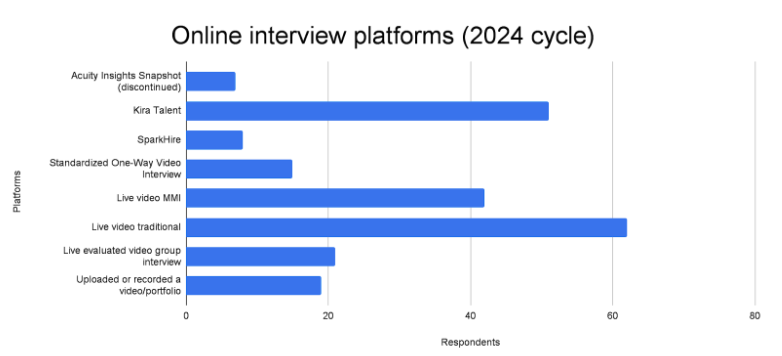
How to prepare for an RVI
Unlike SJTs that require prior registration on specific test dates, RVIs are administered to qualified candidates at the discretion of the admissions committee. Just as some schools will select candidates to receive secondary applications, many will also be selective in inviting applicants to take an RVI.
However, RVIs are not just run as a pre-screening tool. Fifty respondents disclosed when RVIs were used in their application process for the 2024 entering class (Figure 2: How programs use RVIs). While many took an RVI as part of the screening process (to be considered for an interview), others completed an RVI before their live online interview or soon after their interview day. A handful of respondents said one of their programs used an RVI as their only interview.
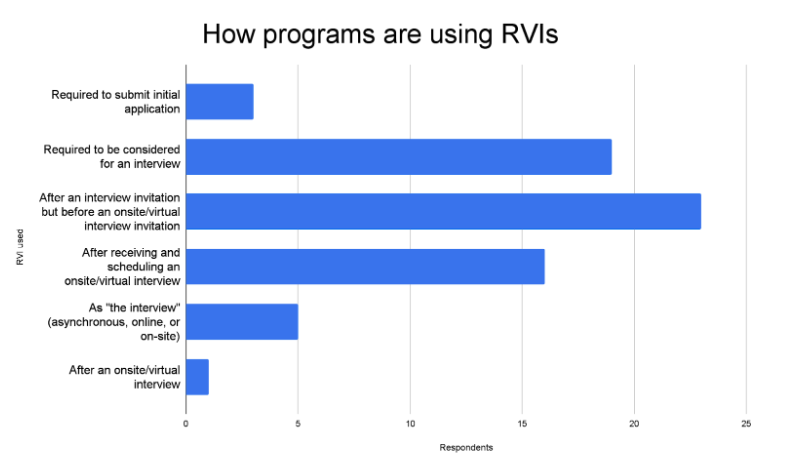
Along with their RVI link, most were told of a specific date to complete the recorded interview (71.7%), given a time window (35.8%), and an anticipated amount of time to complete the RVI experience (39.6%). Programs usually provide additional details:
- Number of expected questions in the interview
- Time for question delivery (most frequently two minutes) and response submission (between two and eight minutes)
- Total interview time
- Practice portal to test technical requirements (camera, microphone)
- Opportunity to test video recording and playback
- Technical support contact information (platform vendor)
- Admissions office administrative support contact information
One program sent example questions to candidates to help their preparation.
Most respondents did not know if the admissions offices had any of these policies about the RVI’s:
- Policies to void the recorded interview and petition for a reset/repeat opportunity
- Policies and procedures regarding privacy and security
- Policies and procedures to request and receive ADA accommodations
- Instructions to activate or deactivate closed-captioning or other language assistance for recorded responses
- Explanation of how recorded responses are reviewed and weighed for committee decisions
Furthermore, some respondents noted that they did not always receive warnings that their response time was running out.
Upon completion of the RVI, most candidates received confirmation from the testing platform, and others received confirmation from the program’s admissions office. After that, applicants usually waited at least 1 week for additional confirmation or follow-up (Figure 3: Post-RVI Follow-up).
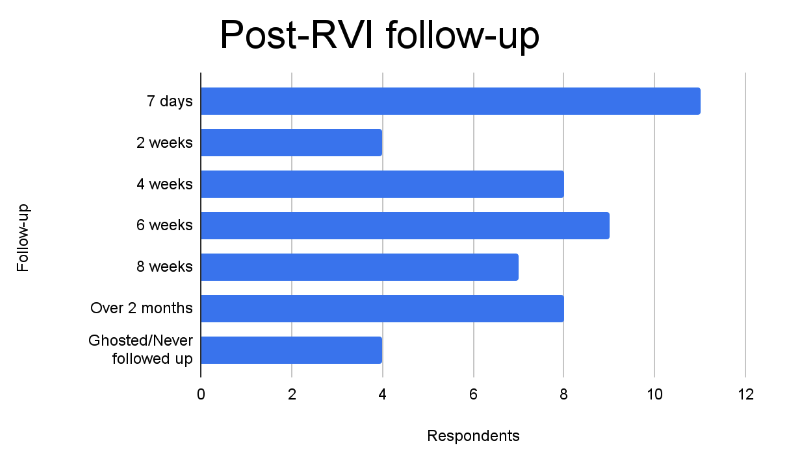
How common are RVIs?
During the 2023-2024 application cycle, 78% of 41 respondents disclosed having to respond to at least one RVI (Figure 4: RVIs experienced by respondents). No respondents in this survey said they took four or more RVIs.
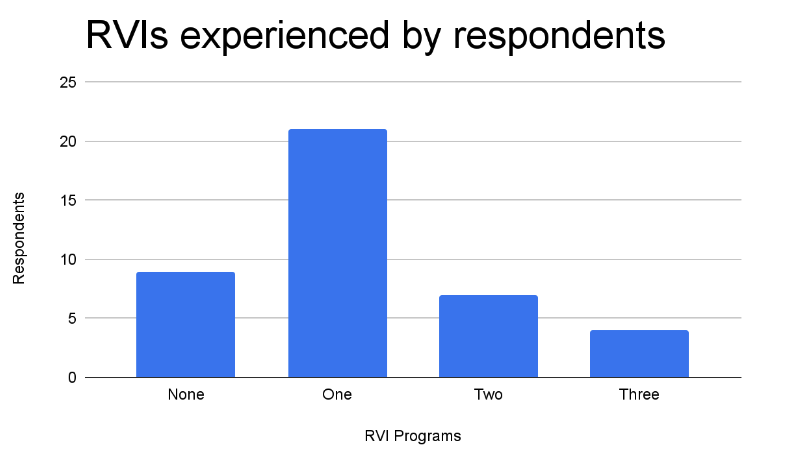
Respondent attitudes towards RVIs
Admissions teams recognize that RVIs offer an opportunity to encourage candidates to view the program’s core values and inclusive community. Quality improvement surveys of candidates show high satisfaction with their experience with RVI’s, but our independent pilot survey results gave a different impression.
Among those who had taken at least one RVI, most respondents generally felt the RVIs were more of an inconvenience and not a tool that helped respondents view the programs more positively (Table). Respondents expressed positive attitudes about RVI’s use as a replacement for SJTs or more neutrally in combination with SJTs.
| RVIs… | Agree | Neutral | Disagree |
|---|---|---|---|
| Helped me express my enthusiasm for the program | 7 | 5 | 20 |
| Made me more excited about attending this program | 5 | 6 | 21 |
| Allowed me to submit my best possible responses | 9* | 1 | 22 |
| Should be an essential part of the admissions process | 5 | 8 | 18 |
| Should be used in place of a live, virtual traditional interview | 4 | 3 | 24 |
| Should be used with a live virtual traditional interview | 5 | 8 | 19 |
| Should be used in place of a SJT | 11* | 10* | 10 |
| Should be used with a SJT | 3 | 11* | 17 |
| Should be used in place of an in-person interview | 4 | 4 | 23 |
| Should be used with an in-person interview | 4 | 6 | 21 |
| Helped me to learn more about the program | 5 | 1 | 25 |
| Made me feel I was a strong fit for the program | 3 | 3 | 26 |
| Helps the program promote its diversity goals | 7 | 7 | 17 |
| Assures me that my participation does not influence decisions on my admission based on my race/ethnicity | 3 | 12* | 16 |
| Very similar questions posed between different programs or schools | 13* | 6 | 8 |
| Cannot prepare in advance | 12* | 3 | 16 |
| Is a different experience for each program that uses it | 10* | 11* | 3 |
(* indicates more positive or neutral responses compared to the overall average)
Applicants had neutral to negative impressions about programs that required an RVI as part of their application process (Figure: Respondents’ impression of programs requiring RVIs). Unsuccessful applicants appreciate any specific feedback about their RVI performance, whether it is receipt confirmation and processing by the admissions committee, how their responses will be used for subsequent admissions decisions, or if scores from previous cycles are accessed for comparison purposes upon reapplication (much like past primary/secondary applications can be). Candidates also appreciate any information about their performance compared to others who took the RVI for that program and what makes a difference.
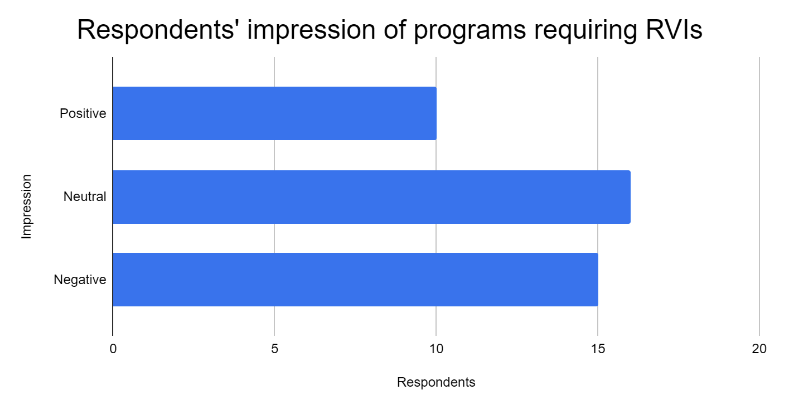
Final preparation
RVIs and your school-specific applications should be considered an audition for an interview at a program. Whether one is asked to complete an RVI before an interview or shortly after your interview day, it allows the program to envision your potential fit as a future member of your community.
When you receive instructions about the RVI platform, take full advantage of testing your technical requirements and getting accustomed to the platform while answering sample questions. Notice and pay attention to warnings as time elapses in the practice exam.
If you are eligible, contact the testing platform about available accommodations. It is rare to pay for taking an RVI (those costs are usually part of your secondary application fee).
Put yourself on a timeline to complete the RVI within a week of receiving the link. For programs that require the RVI as part of the screening process, delaying this RVI also delays your application’s screening review and can put you at a disadvantage to getting an interview.
Secure your surroundings when you are planning your RVI attempt. Your space should be free of distractions, and assure any reviewers that you are not relying on unauthorized help. Follow any instructions to prepare the testing space. Usually, once you begin an RVI, you will have limited opportunities to stop the assessment.
Expect questions about your personal journey, preparation for a health professional career, and alignment with the program. Ask the schools for guidance on questions to expect on the assessment and any contingencies in case of problems with the platform.
Suggestions from survey respondents emphasized authenticity and confidence regarding the assessment process. Ask if personal note-taking can help you outline your answers to each question. Prepare for these interviews with traditional and MMI questions. Get used to answering with succinct answers in front of your computer’s web camera.
Support Future Surveys
Join HPSA/SDN and help us support applicants and trainees in their journey to becoming healthcare professionals with projects like this. Members and donors will be invited to participate in future surveys focused on the virtual interview experience.
